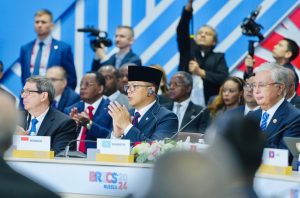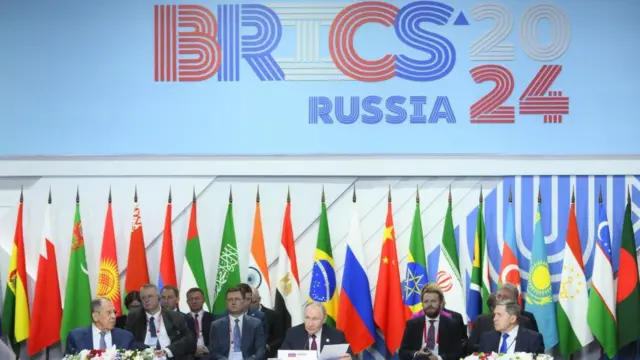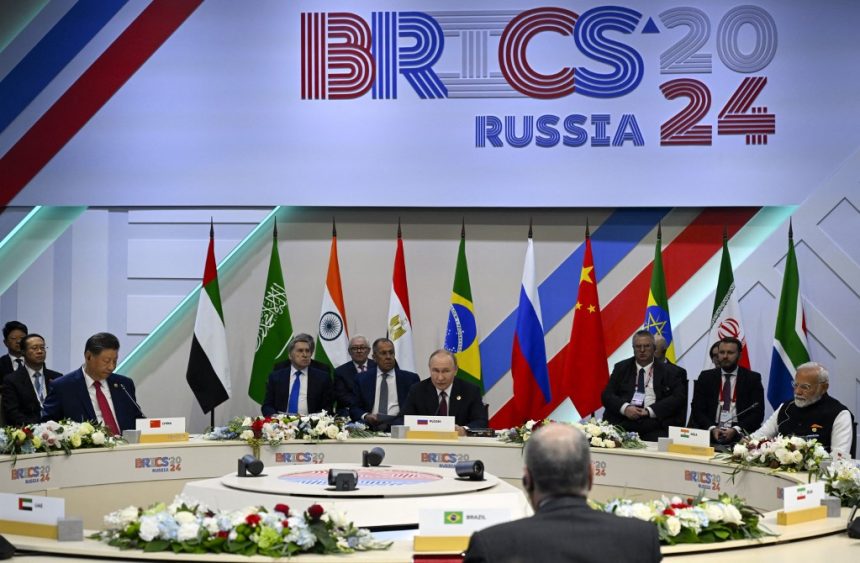Indonesia Eyes BRICS Membership to Strengthen Global South Solidarity
Indonesia has expressed a strong interest in joining BRICS, the prominent alliance of emerging economies comprising Brazil, China, Egypt, Ethiopia, India, Iran, Russia, South Africa, and the United Arab Emirates.
Representing approximately 35% of global economic output, BRICS provides a unique platform for economic cooperation and a unified voice for the Global South. As the BRICS summit convened this week in Kazan, Indonesia’s foreign ministry announced that the process for joining the alliance is officially underway.
Sugiono, Indonesia’s recently appointed Foreign Minister, emphasized that joining BRICS aligns with the country’s “independent-active foreign policy,” reflecting Indonesia’s stance of not aligning with specific geopolitical blocs while participating actively in global forums.
Sugiono explained, “Indonesia joining BRICS is a manifestation of its independent-active foreign policy. This does not mean we join a particular bloc, but rather that we actively participate in every forum.” This position underscores Indonesia’s longstanding commitment to its non-aligned status, which prioritizes building strategic partnerships without aligning exclusively with any power bloc.
Under the leadership of President Prabowo Subianto, who assumed office recently, Indonesia has placed renewed emphasis on fostering relationships with countries across the geopolitical spectrum, including both the U.S. and China.

Prabowo has emphasized his commitment to strengthening ties globally while maintaining Indonesia’s non-aligned stance. He reiterated that Indonesia has no intentions of joining any military alliance, stressing his goal of maintaining balanced relations that serve the country’s strategic interests.
READ ALSO: World Bank Unveils Bold Strategy to Expand Economic Opportunities for Women Globally
Sugiono noted that joining BRICS complements Prabowo’s key governmental priorities, particularly in addressing critical issues such as food and energy security, poverty reduction, and human capital development. He explained that Indonesia envisions BRICS as a “vehicle” for advancing the interests of the Global South, offering a collaborative framework through which emerging economies can collectively pursue equitable development.
As the world’s fourth most populous country and a growing economic power, Indonesia’s entry into BRICS would further strengthen the bloc’s influence on the global stage.
For Indonesia, BRICS membership represents an opportunity to drive initiatives related to sustainable development and to address pressing issues shared by many emerging economies, including economic inequality, technological advancement, and infrastructure development.
BRICS could also provide Indonesia access to new economic partnerships, trade opportunities, and a greater platform for its diplomatic efforts in international forums.
While some, such as international relations expert Yohanes Sulaiman, question whether Indonesia could achieve similar benefits through bilateral relations, Sulaiman acknowledges the symbolic significance of Indonesia’s interest in joining BRICS.
“It’s better to follow than to be left behind,” he said, noting that Indonesia’s participation in BRICS is not necessarily an indication of a shift in foreign policy orientation toward the East. Rather, it demonstrates Indonesia’s commitment to being actively engaged in influential economic alliances that shape global policy.
In addition to its pursuit of BRICS membership, Indonesia has also set its sights on joining the Organisation for Economic Co-operation and Development (OECD), a Paris-based body aimed at promoting policies that improve global economic and social well-being.
Earlier this year, the Indonesian government expressed its ambition to complete the accession process for OECD membership within two to three years, viewing it as an opportunity to attract investment and foster economic cooperation with developed economies. OECD membership would complement Indonesia’s broader goals of economic reform, growth, and competitiveness on a global scale.
The BRICS summit in Kazan took place against a backdrop of complex geopolitical challenges, including ongoing conflicts in the Middle East and Ukraine.

Although these issues were discussed at the summit, there were no definitive steps taken to resolve the conflicts, reflecting the complexities and divergent views within the alliance. The BRICS alliance remains an essential platform for dialogue on such issues, fostering a collaborative space where diverse perspectives are considered, even if consensus is not always achieved.
READ ALSO: U.S. Election: Iranian Hackers Targeting Websites Ahead of 2024 Polls, Warns Microsoft
With a steadfast focus on bolstering the Global South’s influence in world affairs, Indonesia’s potential membership in BRICS marks a significant step toward its broader foreign policy goals. In pursuing economic alliances that serve both national and regional interests, Indonesia is shaping a role as an emerging leader committed to inclusive and sustainable development on the world stage.
As the country moves forward under Prabowo’s leadership, BRICS membership is set to complement Indonesia’s objectives and provide new avenues for collaboration in tackling shared challenges.
By joining BRICS, Indonesia aims to strengthen its position within a growing coalition of emerging economies, advocating for the development needs of the Global South and fostering solidarity amid shifting geopolitical dynamics.

